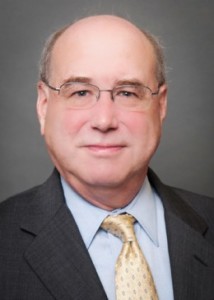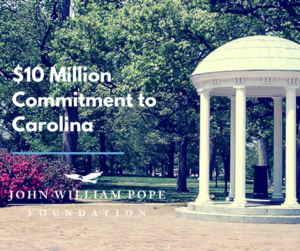
The people of North Carolina invested early in public education. In 1789, University of North Carolina was the country’s first publicly chartered university (sorry, Virginia). Our state constitution further states that the benefits of higher education should “as far as practicable, be extended to the people of the State free of expense.”
Today, UNC-Chapel Hill has the lowest tuition among America’s top public research universities, at about $9,000. But the actual cost of education is far higher. To make up the difference at Chapel Hill and other UNC campuses, North Carolina taxpayers are generous — appropriating nearly $10,000 per student, ranking the state fifth in the country.
Still, appropriations and tuition aren’t enough to produce excellence. Great public universities require and deserve voluntary private support. Those who have benefited from them should happily “give back,” however they can.
Like many Depression-era North Carolinians, my father John Pope was one of those beneficiaries. He entered UNC in 1940 at age 16, left to serve in the Army Air Corps during World War II, and then returned to complete his B.S. degree in commerce. After graduation, he put aside the lure of becoming a New York City “ad man” to stay in North Carolina. He grew his family’s business from five stores to a retail chain, Variety Wholesalers, that employs thousands of people and serves hundreds of communities.
I followed in my father’s footsteps and also attended UNC-CH for an undergraduate degree in political science — but, to my dad’s dismay, earned a law degree from that private university and basketball rival down the road. My daughter continued the family tradition, earning her undergraduate and law degrees at UNC.
I’ve been fortunate to be able to continue growing our family business while serving in the General Assembly and as state budget director. My daughter and I have also worked at our foundation, helping to ensure we stay close to my family’s mission of investing in opportunity for North Carolinians.
Largely because of what we learned at Chapel Hill, we believe excellence isn’t just about the amount of money an institution receives but about how well it is spent. When UNC announced its $4.25 billion “Campaign for Carolina,” the Pope Foundation studied the university’s needs carefully.
We decided to embrace the opportunity to give back to UNC’s “strategic triad” of teaching, research, and public service with a $10 million gift: $5 million for cancer research; $3.75 million for UNC’s innovative Philosophy, Politics and Economics program; $1 million to fund track-and-field scholarships; and $250,000 to UNC Horizons to evaluate its unique addiction-treatment program.
The university’s primary responsibility is to educate. The Philosophy, Politics and Economics program is a rigorous course of study and such a popular minor that it can’t keep up with student demand. As for track and field, it teaches student-athletes invaluable lessons about initiative, perseverance, and teamwork.
We will advance UNC’s research mission with a $5 million gift to the Lineberger Cancer Center that builds on previous foundation-supported programs to create the new John William Pope “Tomorrow’s Best Hope” Endowed Fellowship Fund. This will allow six postdoctoral fellows to conduct path-breaking research on cancer treatment and prevention.
An impressive example of public service, UNC Horizons is a national pioneer in combating substance abuse among pregnant women and new mothers. Our gift will help fund an evaluation of its treatment program and encourage others to follow its lead.
When state institutions of higher learning succeed at their core missions, we all benefit. My family and I are honored to contribute to UNC — to achieve the Lux et Libertas, the “Light and Liberty,” that graces the university’s seal. We hope other North Carolinians will do the same.
Published by the News & Observer on April, 23, 2018: http://www.newsobserver.com/opinion/article209353919.html
